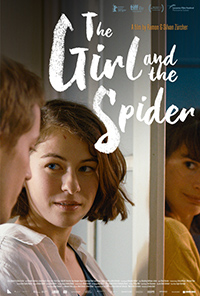A Roommate of One’s Own: The Zurcher Bros. Cast a Spell in Weirdo Existential Melodrama
 The two central characters of Ramon and Silvan Zurcher’s enchantingly bizarre sophomore film The Girl and the Spider really are together apart in this microcosm of shifting spaces and relationships which dances irrevocably into the existential even as it remains pertly banal.
The two central characters of Ramon and Silvan Zurcher’s enchantingly bizarre sophomore film The Girl and the Spider really are together apart in this microcosm of shifting spaces and relationships which dances irrevocably into the existential even as it remains pertly banal.
An ambitious ensemble imbues two juxtaposed environments, mirror images of apartment complexes in Bern, Switzerland, one about to receive a presence as the other undergoes an absence. Ramon Zurcher once more directs a project conceived alongside his brother Silvan, and is a long-awaited follow-up to their distinctive debut, The Strange Little Cat, a breakout on the 2013 film festival circuit as it journeyed from the Berlinale to the ACID program in Cannes. Their latest confection is as fragile as a spider’s web, and yet its wispy tendrils are so intriguingly complex the delightful idiosyncrasies of its droll, painstakingly elaborate design finds a narrative adumbrated in plain sight.
Lisa (Lilian Amaut) is moving into her own apartment for the first time, which signals the end of an era for her flatmates Mara (Henriette Confurius) and Markus (Ivan Georgiev). Mara is particularly affected, mooning about in Lisa’s new flat, which is being renovated by Jurek (Andre Hennicke) and his employee Jan (Flurin Giger). Lisa’s mother Astrid (Ursina Lardi) is on hand, who seems relieved at her daughter’s separation from a bohemian lifestyle, but whose flirtation with Jurek adds uncomfortable tension between mother and daughter. Cue the new downstairs neighbor Karen (Sabine Timoteo), who crashes the scene, sparking jealousy within Mara. As the core troupe retreats to Lisa and Mara’s old apartment for a farewell party, Mara’s estrangement becomes more insular, though a similar dance between the flat mates below, Kerstin (Dagna Litzenberger-Vinet) and her roommate Nora (Lea Draeger) adds another layer of refracted passions.
As Mara, Henriette Confurius (Beloved Sisters, 2014) is clearly an odd duck. Hanging out in the bathroom of Lisa’s new apartment, it takes us a while to orient ourselves in this situation. Eventually, it seems she’s haunting the periphery of Lisa’s new life, the exact extent of their relationship unclear. A mix of sexual tension and sweltering emotion, as revealed by Mara’s frequent dips into memory, parlays into an actual sequence with a rather alarmingly large arachnid (at least for those wandering around inside urban dwellings). It seems the insect is a welcome connective tissue, as pertinent to the environment as the human denizens. Mara’s oozing herpes sore strangely becomes a metaphor for her character, popping up at all the wrong times, more a hindrance than helpmate. Tensions between Mara and Lisa’s mother Astrid, who has the hots for Jurek, hired by Lisa as a handyman in the transition, causes strange shifts in sympathies, with mother at first barely hiding her disgust for Mara before using the ex-roommate as a confidante.
Lisa’s move from one apartment to another is situated in a position which allows for a similar dynamic with the downstairs neighbors. In her new abode is Sabine Timoteo, whose gurgling baby, young daughter, dog and cat freely encroach on Lisa’s bustling apartment before her own libido forces her to make a pass at Mara. Meanwhile, Jurek’s employee Jan also has eyes for Mara, though this attraction is interrupted when he sleeps with Kerstin, the downstairs neighbor at Lisa and Mara’s old apartment. And then let’s not even get into Nora, a naked, vampiric nymphette who lives with Kerstin, works out excessively at night (“the darkness is her skin…sunlight is her death”) or Mrs. Arnold, the elderly woman upstairs who sometimes abducts another neighbor’s cat…
The characters of The Girl and the Spider seem to exist in a parallel universe wherein the façade of polite conversation has eroded enough for them to utter strange, sometimes uncomfortable observations. Not quite a stream of consciousness but certainly not contained by the fear of any sort of social backlash, each apartment setting is teeming with people so intensely set on connection their energies seem to feverishly melt away the possibility of intimacy or sentiment.
As in their delightfully bizarre The Strange Little Cat, musical cues provide an integral part of the narrative vertebrae, here characterized in the repeated use of Eugen Doga’s moody Gramofon. Not surprisingly, Mrs. Arnold and the incident relayed concerning the cat provides the template for Mara and her feelings towards Lisa, a creature comfort she can no longer control, forced to contend with existence on all on her own.
Reviewed on March 2nd at the 2021 (virtual edition) of the Berlin International Film Festival – Encounters Program. 98 Mins.
★★★½/☆☆☆☆☆


